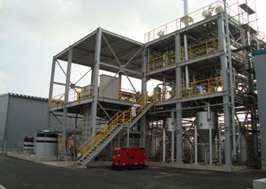Kawasaki Successfully Produces Bioethanol from Rice Straw
Oct. 06, 2010

Tokyo, October 6, 2010 — Kawasaki Heavy Industries, Ltd. announced today that it has employed an advanced subcritical water-based bioethanol production technology to successfully produce bioethanol from rice plants for use as automobile fuel.
This latest achievement is all part of a larger national bioethanol demonstration project, an initiative by Japan’s Ministry of Agriculture, Forestry and Fisheries (MAFF) to establish a bioenergy technology utilizing untapped soft cellulose biomass such as rice straw and husk that will not compete with food production. Kawasaki has been working on the project jointly with Akita Agriculture Public Corporation since January 2009. Kawasaki is responsible for bioethanol production and automobile performance testing with the support of the Akita Prefectural Government while Akita Agriculture Public Corporation is in charge of soft cellulose harvesting and transportation test operations.
Kawasaki designed and built a test production plant with a daily bioethanol output of 200 liters in Akita Prefecture’s Katagami City in November 2009. Road tests using the new bioethanol fuel produced at the plant were conducted at the Solar Sports Line in the prefecture’s renowned rice production region of Oogata. The tests demonstrated that a flexible fuel vehicle (FFV) operated stably and proved that the new soft cellulose-based fuel met current automobile fuel standards.
The bioethanol production demonstration project harnesses Kawasaki’s advanced subcritical water-based bioethanol production technology for the saccharification of cellulose. Unlike conventional systems using sulfuric acid or enzymes, this new technique utilizes subcritical water to saccharify cellulose. The new system cuts production costs by eliminating the need for a sulfuric acid recovery system, acid-resistant chamber, as well as any enzymes which are currently being traded at high prices. The technique can also be used to saccharify soft cellulose materials other than rice straw and husk by simply altering the heated water conditions.
Kawasaki designed and manufactured all of the bioethanol production plant’s pretreatment, saccharification, fermentation, distillation, and dehydration processing facilities. Kawasaki will continue to conduct tests with an eye to cutting production costs until the project ends in March 2012. The ultimate goal is to lower per-liter production cost to 40 yen or less before commercializing the system.
Kawasaki is helping to build a sustainable society through the development and application of technologies and systems that reduce emissions and make efficient use of untapped, renewable energy sources, such as biomass, wind and solar power.
Overview of the Test Bioethanol Production Plant
| Location: | Showa Industrial Complex, Katagami City, Akita Prefecture |
| Maximum production capacity: | 200 liters/day (plant to operate up to 112 days/year) |
| Site area: | 4,800 m2 (80 m x 60 m) |
| Ethanol concentration: | 99.5 vol% |





